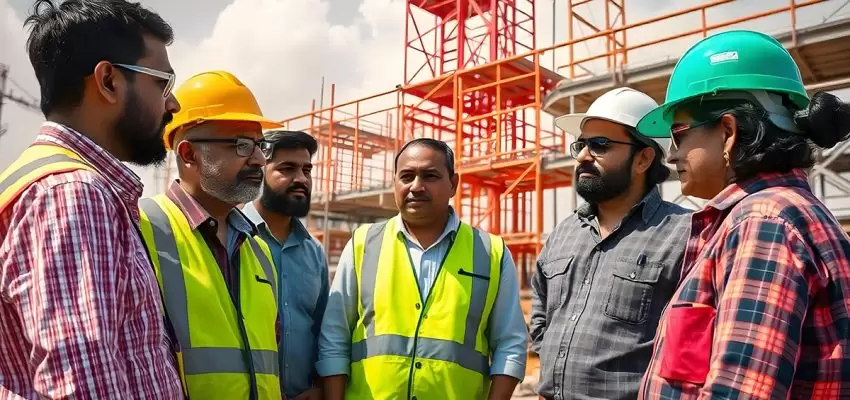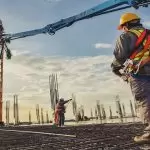Before actually discussing the challenges construction contractors in India face, it is important to explain the role that construction contractors play. Construction contractors are those individuals or organizations that undertake construction projects. Their functions vary from project management to procurement of materials, coordination of labourers, quality control, safety, and regulatory aspects.
Post your Requirement
What Are The Problems Faced By Construction Workers in India?
The construction sector occupies a significant position in the Indian economy, contributing significantly to GDP and employing millions of people. However, it is not without its problems. In the sections that follow, out of the top 10 challenges that the construction contracts are facing in India, what the implications are and what the possible solutions could be have been specified.
1. Regulation Obstacles
- Issue: The Indian construction industry is, therefore, a maze of various practices, policies, and standards on different regulations. Among these could be building codes, safety protocols, environmental regulations, and even labour laws. How demanding and frequent the changes to these various regulations could prove challenging for any contractor.
- Impact: Navigating these regulatory frameworks usually involves project delays, heavy fines for non-compliance, and often, litigation. Delays in delivery hold particular significance to industries involved with what this company does. Those issues compromise the contractor’s reputation and financial stability.
- Solution: These effects could be minimized if the tenders have risk-based due diligence compliance management systems, which keep the contractors abreast of current provisions. Training the staff on legal requirements may further enhance the chances of compliance. Partnering with legal advisors specialized in construction law may further ensure observance of regulations.
2. Financial Management Issues
- Issue: Financial management is another very important aspect of running a construction business. At the commencement stages of projects, contractors incur a huge cash outgo while the payment from the client may not be collected at the same time causing cash flow problems.
- Impact: Since poor financial planning may not place a firm in a position where it can meet payrolls, buy materials, or settle the accounts of subcontractors and assistants, this may not only affect the timeline of completing a given project but may also lead to the abandonment of a project that goes a long way in damaging the reputation of a contractor.
- Solutions: They ought to adopt best practices such as proper budgeting, constant cash flow forecasting and an emergency reserve fund. Accounting software designed for construction can efficiently carry out financial processes while offering a real-time means of financial insight.
3. Labour Shortages
- Issue: Labour scarcity has been the case in India when it comes to their construction. The contributors to this could be rural-urban migration, seasonal employment, and a lack of skill sets.
- Impact: Skilled labour scarcity can cause delays, higher labour costs, and poor work quality. Furthermore, flux within the workforce may even affect consistency in the project, ultimately culminating in client dissatisfaction.
- Solutions: Contracting firms need to consider in-house training programs or collaborative programs with vocational training institutes to build a competent workforce. Competitive salary and compensation packages and benefits are another way through which firms can attract the best talent and retain them in the firm. A humane working culture may also help retain labour.
4. Quality Control And Safety Standards
- Issue: It is a big challenge to ensure a quality construction process and all safety standards at work.
Most Indian construction sites tend to pose hazards and risk of accidents and injuries due to inadequate safety measures. - Impact: Neglecting quality control and safety may result in serious accidents, legal liabilities, and time-consuming delays. Beyond these, poor quality may result in client dissatisfaction, damage to reputation, and even possible legal aftermath.
- Solutions: All contractors should have stringent quality control and safety training processes to ensure quality and safety. Regular audits, checks, and safety drills will ensure that all safety standards are followed. Third-party quality assurance firms can be engaged to provide objective appraisal of construction practices.
5. Delayed Project
- Issue: Construction projects are very prone to delays. Notably, this is due to several factors including weather conditions, supply chain, and poor management of the project.
- Impact: Delayed projects affect profitability as well as the relationship between the contractor and clients. Protracted delays lead to a loss of reputation, therefore one loses future contracts among other things.
- Solutions: Minimize delays by making effective project management a best practice. Contractors should embrace project management software that can make communication, scheduling, and resource allocation much easier. Reviewing construction project timelines and planning ahead of time to address potential delays is also helpful in avoiding their impacts.
6. Supply Chain Disruptions
- Issue: Construction materials and equipment come from a web of suppliers. This almost complex web can be disrupted easily due to geopolitical issues, natural calamities, or specific logistical problems, which can impact the project timelines drastically.
- Impact: Supply chain disruption is likely to result in cost overruns, delays in projects, and impaired quality. These issues may also lead to spiralling and influence client and supplier relationships.
- Solutions: Diversification of a contractor’s supplier base minimizes dependence on a sole source. Good relationships with multiple sources ensure reliability and flexibility. Stock-holding supplies of key supplies also serve as insurance against the impact of supply chain disruption.
7. Technological Adoption
- Issue: The construction industry is one of the slowest industries when it comes to adopting new technology in India. It has taken a relatively back step amongst the other industries in terms of new technology adoption. Innovations that seem to add something of their worth to productivity are Building Information Modeling or BIM, drones, and project management software. Most contractors do not take on investments in any of these technologies.
- Impact: There could be a lack of embracing technology, causing inefficiencies and higher operational costs, inability to compete with a more technologically adept firm, reduced profitability, and market share.
- Solutions: Costs and benefits should be analyzed by the contractors to understand the return on investment in the technology. Education of employees on new systems should be undertaken to ensure that they uptake the system correctly. Besides, attending industry conferences and seminars will keep informed on technological advancement by the contractors.
8. Environmental Concerns
- Issue: With more environmental sustainability awareness, construction contractors are under pressure from society to embrace greener principles in their operations. Some of these will include reducing waste, using materials that are environmentally friendly, and many regulations related to the environment.
- Effects: The lack of concern over environmental issues can have effects including legal implications, public odds against them, and further damaging its reputation. In addition, construction practices that do not take sustainability into account risk jeopardizing its long-term sustainability.
- Solutions: Sustainable practices: The contractors should have programs for waste management, energy efficiency in construction, and other sustainable practices. Since their customers have interacted with environmental consultants to be compliant with the regulations, the above have a better chance of being implemented.
9. Competition And Pricing Pressure
- Issue: The Indian construction industry is rather competitive, featuring numerous small and big contractors who want the same few projects. As a result, most of the contractors opt for aggressive pricing, which generally represents a compromised profitability scenario.
- Impact: Pressure on price chases the margin down to an extent where the contractor has little choice but to cut back on quality. This facilitates a circle of underbidding and financial insecurity within the trade.
- Solutions: The contractor’s business should build on a reputation based on strength rather than competing purely on price, namely based on quality, reliability, and customer service. Offering value-added services such as after-sales support or maintenance will put contractors further ahead of the competition.
10. Client Expectations Management
- Issue: Client expectations management is one of the significant inputs for successful project execution. Contractors are often under high pressure to ensure that deliveries of the projects occur within a time frame and within on-budget constraints, which may lead to potential conflict.
- Impact: When client expectations are not managed properly, it can result in dissatisfaction, disputes, and damage to a contractor’s reputation. A contractor who fails to communicate effectively is likely to have misunderstandings regarding project scope, timelines, and costs.
- Solution: For efficient communication and management of client expectations, clear lines of communication must be established together with realistic timelines and budgets. The project owner may be constantly updated on the work progressing at every stage for understanding and, therefore, trust.
Reliability and transparency can help build solid relationships with clients that lead to repeat business and referrals.
Conclusion
The Indian construction industry is at an inflexion point: it poses enormous challenges for contractors while providing them with tremendous opportunities for growth. Problems encountered in the changing scenario of this industry, be it involvement from the regulatory side, competition, or any other factor, can be tackled if the construction contractors are aware of the key issues.
One way to handle all these changes would be to invest positively in technology, training, and compliance measures. Moreover, adopting sustainable practices, and adhering to quality rather than low quotation competitiveness would enhance contractors in the relentlessly changing market.
In short, crossing these hurdles would enable construction contractors operating from India to work more effectively with better project results and hence positively impact India’s economy. Innovation, adaptability, and quality form new-age foundations’ proper definition of success in construction contracting in India.























Post A Comment